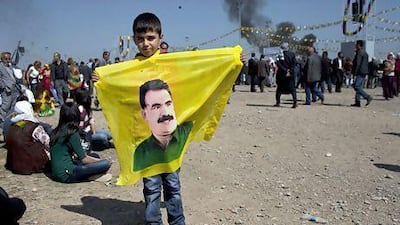DIYARBAKIR, Turkey // For nearly three decades, the Kurdistan Workers' Party has waged one of the world's bloodiest insurgencies against the Turkish government, in a bid for autonomy and greater rights for the country's Kurdish minority.
So when Abullah Ocalan, the leader of the militant Kurdistan Workers' Party (PKK), called for a ceasefire on Thursday, it was greeted with widespread praise and cautious optimism.
"A new era has started, where it is politics, not guns, that is at the forefront," Mr Ocalan said in a long-expected declaration coinciding with the new-year festival of Nowruz.
Yet among some members of the generations of Kurdish youth who have come of age during the fighting, the absence of gunfire, bomb blasts and air strikes are not the same thing as peace. That will only come, they say, when social reconciliation between Turks and Kurds occurs.
"The different societies need an agreement," said Ronni, a 29-year-old Kurdish woman. "They need to be equal and conceived as human beings first."
It is not difficult to understand the scepticism of this young generation, which has grown up not knowing peace. More than 40,000 people have died since the conflict began in 1984.
Piremerd, a Kurdish youth, was one of the casualties. Detained by Turkish authorities about four years ago, when he was 17, he spent a year in jail without ever being convicted. After being released, he went to work for a Kurdish news agency, but faced continued surveillance and was interrogated by authorities multiple times.
"They didn't let him have peace of mind," said a friend, Amed, 21. Because Amed has a court case open against him, he asked that both he and Piremerd be identified using pseudonyms.
The two met in prison and after being released were rarely apart, until Piremerd joined the PKK and died fighting the Turkish army.
"He was wounded and killed himself with a grenade to avoid capture," said Amed. He added that a number of other friends had joined the PKK in recent years.
Such volunteers rarely tell anyone before setting off for the mountains of northern Iraq, where the PKK is based, Amed said.
Instead, a point is reached where they can no longer cope with the oppression of the Turkish state.
"Piremerd was chasing good things for the people," Amed said. "Eventually, he decided to go up to the mountains."
Thousands of Kurds are currently in jail under Turkey's sweeping terrorism laws, said Emma Sinclair-Webb, a Turkey researcher for Human Rights Watch. "The more people you put in prison the more radical people become," she said.
The degree of repression they have grown up with gives young Kurds a different point of view on the prospect of peace.
"A mother's perception of the war and a young generation's perceptions of the war are different because the young one has grown up totally in a conflict environment," said Ronni.
Radicalised Kurdish youth such as Amed and Piremerd, who are estimated by the Turkish human-rights lawyer Orhan Kemal-Cingiz to number in the thousands, give additional importance to the new peace initiative between Mr Ocalan and the Turkish authorities.
Mr Ocalan's call for a ceasefire that will see PKK militants withdraw from Turkey was presented by the Kurdish Peace and Democracy Party (BDP) to thousands of people during the Nowruz celebrations in Diyarbakir on Thursday.
With faith in both Mr Ocalan and the BDP, Kurds old and young expressed cautious optimism about the prospects of a renewed peace process. But it is an optimism inspired by the terrible alternative: to see another generation of Kurdish youth go into battle.
Critics have speculated that the government could declare the peace process a victory after a cessation of armed hostilities and not follow through with the reforms demanded by Kurds.
Kurdish youth gave examples of what they needed to see for the initiative to succeed.
Amed said that Turkey needed to change its laws to work for its citizens.
"Justice must be for protecting the people," he said. "But in Turkey it works the opposite way. The laws are working against the people."
Ronni said the Turkish government must make public statements about why Kurdish identity was denied in the past and "confess the truth" and its "lies" to Turkish society.
Celel, 32, who was released from prison only two months ago, said the government must release other Kurdish prisoners.
Still, despite Kurdish concerns that the Turkish government will betray the peace process, there were already some positive signs in Diyarbakir. At least two nursery schools in the city teach in Kurdish, which is illegal under current laws.
"While I was in primary school, I sang a Kurdish song and was beaten by a teacher," said Ebru Hilal Sanli, 35, a Kurdish teacher at one of the nurseries. "Now we are teaching here and the classes are in Kurdish. It feels so good that we are able to do this in our mother tongue."
Abdullah Demirbas, the mayor of Diyarbakir's Sur municipality, is among those establishing Kurdish-language programmes.
But while he chose to work non-violently, his son joined the PKK four years ago, having decided the Turkish government understood only violence, Mr Demirbas said.
"It's going to be very, very difficult if this peace process does not work out," he said. "It will be very difficult because a very aggressive generation is coming."

